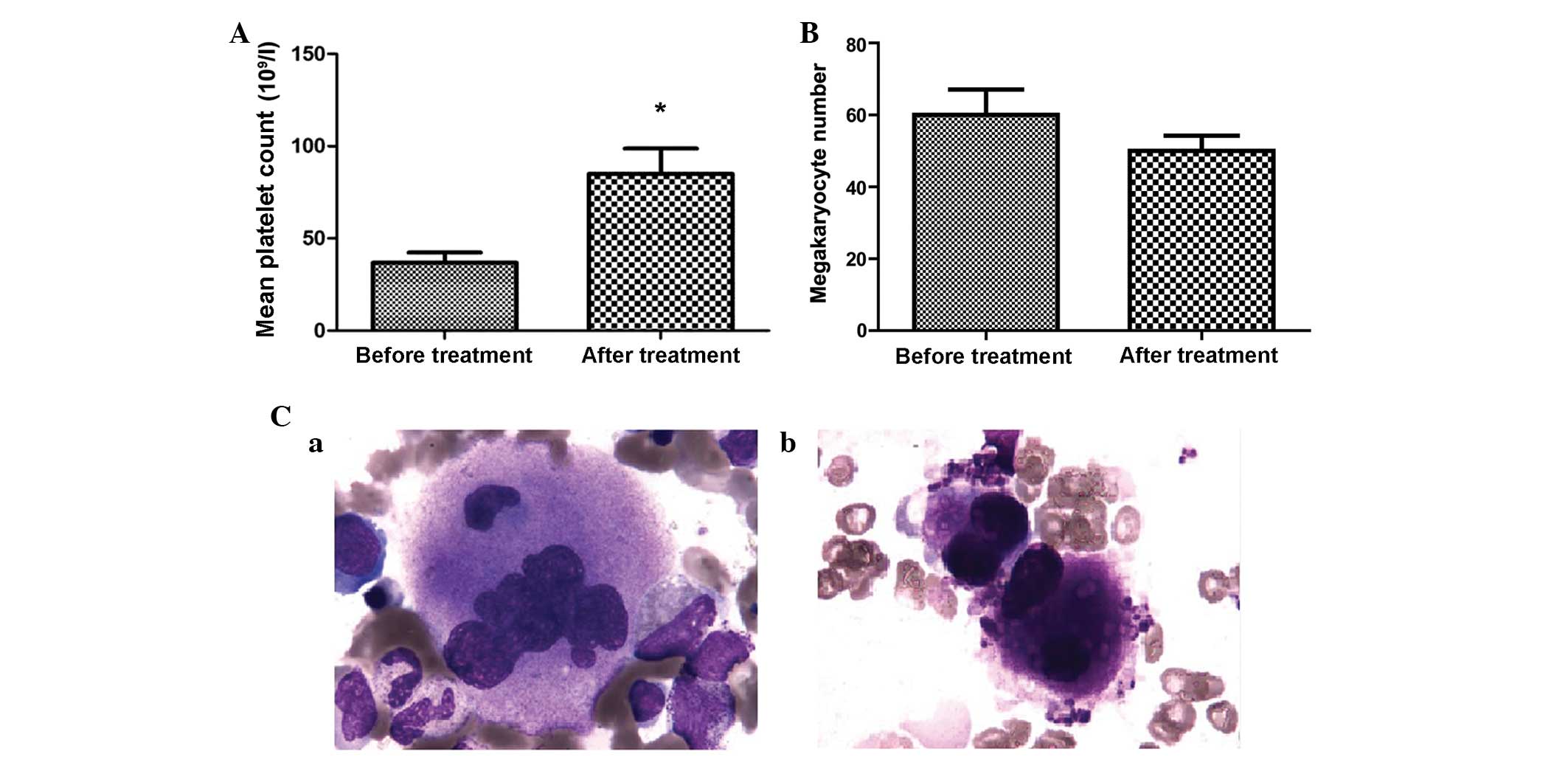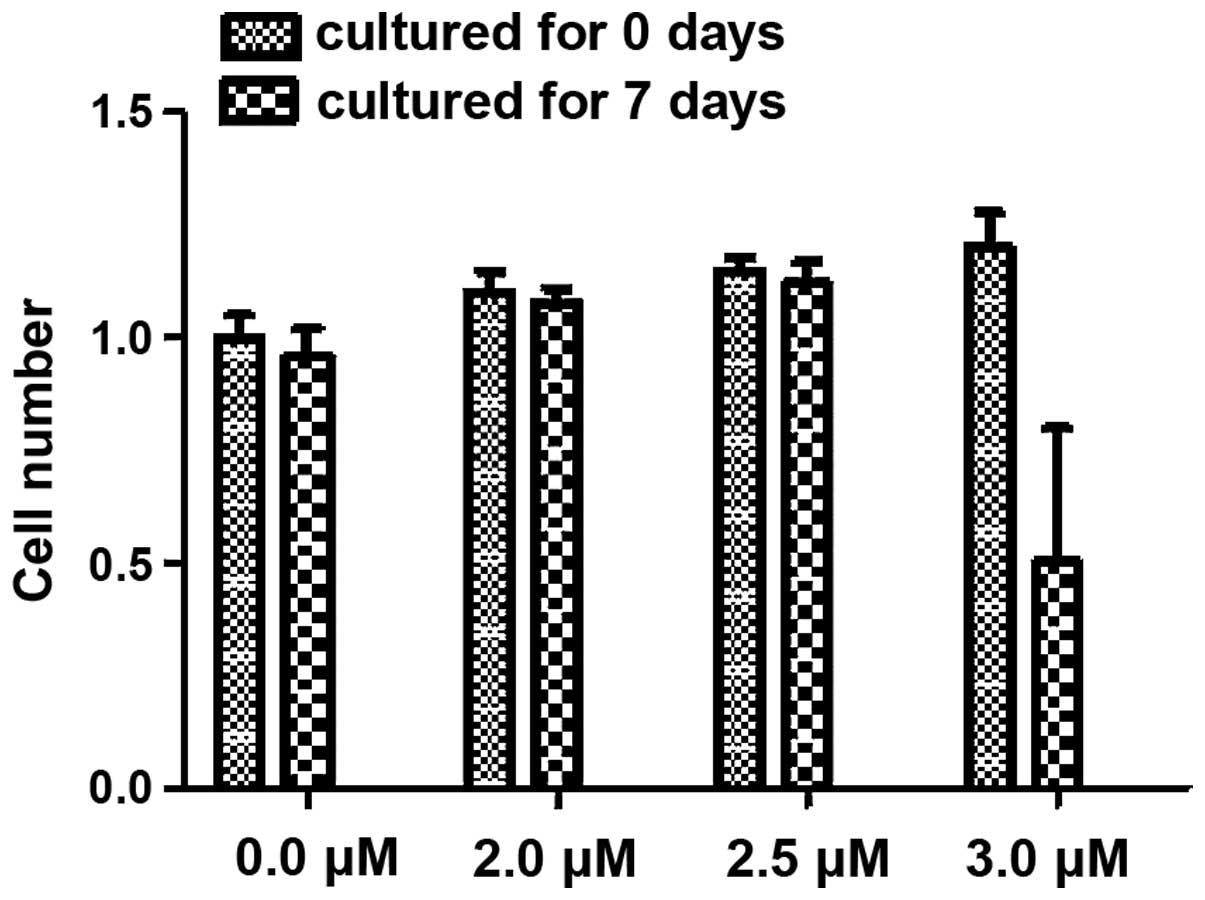|
1
|
Steensma DP and Tefferi A: The
myelodysplastic syndrome(s): A perspective and review highlighting
current controversies. Leuk Res. 27:95–120. 2003. View Article : Google Scholar : PubMed/NCBI
|
|
2
|
Kantarjian H, Giles F, List A, Lyons R,
Sekeres MA, Pierce S, Deuson R and Leveque J: The incidence and
impact of thrombocytopenia in myelodysplastic syndromes. Cancer.
109:1705–1714. 2007. View Article : Google Scholar : PubMed/NCBI
|
|
3
|
Webb JJ and Anderson KC: Risks, costs and
alternatives to platelet transfusion. Leuk Lymphoma. 34:71–84.
1999. View Article : Google Scholar : PubMed/NCBI
|
|
4
|
List A, Kurtin S, Roe DJ, Buresh A,
Mahadevan D, Fuchs D, Rimsza L, Heaton R, Knight R and Zeldis JB:
Efficacy of lenalidomide in myelodysplastic syndromes. N Engl J
Med. 352:549–557. 2005. View Article : Google Scholar : PubMed/NCBI
|
|
5
|
Richel DJ, Colly LP, Kluin-Nelemans JC and
Willemze R: The antileukemic activity of 5-aza-2-deoxycytidine
(Aza-dC) in patients with relapsed and resistant leukaemia. Br J
Cancer. 64:144–148. 1991. View Article : Google Scholar : PubMed/NCBI
|
|
6
|
Lübbert M, Wijermans P, Kunzmann R,
Verhoef G, Bosly A, Ravoet C, Andre M and Ferrant A: Cytogenetic
responses in high-risk myelodysplastic syndromes following low-dose
treatment with the DNA methylation inhibitor 5-aza-2-deoxycytidine.
Br J Haematol. 114:349–357. 2001. View Article : Google Scholar : PubMed/NCBI
|
|
7
|
de Vos D and van Overveld W: Decitabine: A
historical review of the development of an epigenetic drug. Ann
Hematol. 84(Suppl 1): S3–S8. 2005. View Article : Google Scholar
|
|
8
|
Hennessy BT, Garcia-Manero G, Kantarjian
HM and Giles FJ: DNA methylation in haematological malignancies:
The role of decitabine. Expert Opin Investig Drugs. 12:1985–1993.
2003. View Article : Google Scholar : PubMed/NCBI
|
|
9
|
Wang J, Yi Z, Wang S and Li Z: The effect
of decitabine on megakaryocyte maturation and platelet release.
Thromb Haemost. 106:337–343. 2011. View Article : Google Scholar : PubMed/NCBI
|
|
10
|
Wijermans P, Krulder JW, Huygens PC and
Neve P: Continous infusion of low dose 5-aza-2′-deoxycytidine in
elderly patients with high-risk myelodysplastic syndromes.
Leukemia. 11:1–5. 1997. View Article : Google Scholar : PubMed/NCBI
|
|
11
|
Wijermans P, Lübbert M, Verhoef G, Bosly
A, Ravoet C, Andre M and Ferrant A: Low dose
5-aza-2′-deoxycytidine, a DNA-hypomethylating agent for the
treatment of high-risk myelodysplastic syndromes: A multicenter
phase II study in elderly patients. J Clin Oncol. 18:956–962.
2000.PubMed/NCBI
|
|
12
|
Van den Bosch J, Lübbert M, Verhoef G and
Wijermans PW: The effects of 5-aza-2′-deoxycytidine (Decitabine) on
the platelet count in patients with intermediate and high-risk
myelodysplastic syndromes. Leuk Res. 28:785–790. 2004. View Article : Google Scholar : PubMed/NCBI
|
|
13
|
Peng HY and Liao HF: Staurosporine induces
megakaryocytic differentiation through the upregulation of
JAK/Stat3 signaling pathway. Ann Hematol. 90:1017–1029. 2011.
View Article : Google Scholar : PubMed/NCBI
|
|
14
|
Brunning R, Orazi A, Germing U, et al:
Myelodysplastic syndromes. World Health Organization Classification
of Tumours of Haematopoietic and Lymphoid Tissue. Swerdlow S, Campo
E, Harris NL, et al: (4th). IARC Press. (Lyon, France). 88–103.
2008.
|
|
15
|
Cheson BD, Bennett JM, Kopecky KJ, Büchner
T, Wiliman CL, Estey EH, Schiffer CA, Doehner H, Tallman MS, Lister
TA, et al: International Working Group for Diagnosis,
Standardization of Response Criteria, Treatment Outcomes, and
Reporting Standards for Therapeutic Trials in Acute Myeloid
Leukemia: Revised recommendations of the International working
group for diagnosis, standardization of response criteria,
treatment outcomes, and reporting standards for therapeutic trials
in acute myeloid leukemia. J Clin Oncol. 21:4642–4649. 2003.
View Article : Google Scholar : PubMed/NCBI
|
|
16
|
Greenberg PL, Attar E, Bennett JM, et al:
National Comprehensive Cancer Network: NCCN Clinical Practice
Guidelines in Oncology: Myelodysplastic syndromes. J Natl Compr
Canc Netw. 9:30–56. 2011.PubMed/NCBI
|
|
17
|
Gajendra S, Jha B, Goel S, Sahni T, Sharma
R, Shariq M, Jaiswal S and Sachdev R: Leishman and Giemsa stain: A
new reliable staining technique for blood/bone marrow smears. Int J
Lab Hematol. Jul 30–2015.(Epub ahead of print). View Article : Google Scholar : PubMed/NCBI
|
|
18
|
Mori H, Niikura H, Terada H and Fujita K:
Morphological analysis of the megakaryocytes in myelodysplastic
syndrome. Rinsho Byori. 38:1347–1352. 1990.(In Japanese).
PubMed/NCBI
|
|
19
|
Bluteau D, Lordier L, Di Stefano A, Chang
Y, Raslova H, Debili N and Vainchenker W: Regulation of
megakaryocyte maturation and platelet formation. J Thromb Haemost.
7(Suppl 1): 227–234. 2009. View Article : Google Scholar : PubMed/NCBI
|
|
20
|
Gao X, Wu J, Zou W and Dai Y: Two ellagic
acids isolated from roots of sanguisorba officinalis L. Promote
hematopoietic progenitor cell proliferation and megakaryocyte
differentiation. Molecules. 19:5448–5458. 2014. View Article : Google Scholar : PubMed/NCBI
|
|
21
|
Giagounidis A, Mufti GJ, Fenaux P, Germing
U, List A and MacBeth KJ: Lenalidomide as a disease-modifying agent
in patients with del (5q) myelodysplastic syndromes: Linking
mechanism of action to clinical outcomes. Ann Hematol. 93:1–11.
2014. View Article : Google Scholar : PubMed/NCBI
|
|
22
|
Valent P, Bain BJ, Bennett JM, Wimazal F,
Sperr WR, Mufti G and Horny HP: Idiopathic cytopenia of
undetermined significance (ICUS) and idiopathic dysplasia of
uncertain significance (IDUS) and their distinction from low risk
MDS. Leuk Res. 36:1–5. 2012.PubMed/NCBI
|
|
23
|
Momparler RL, Bouffard DY, Momparler LF,
Dionne J, Belangerc K and Ayoub J: Pilot phase I–II study on
5-aza-2-deoxycytidine (Decitabine) in patients with metastatic lung
cancer. Anticancer Drugs. 8:358–368. 1997. View Article : Google Scholar : PubMed/NCBI
|
|
24
|
Koshy M, Dorn L, Bressler L, Molokie R,
Lavelle D, Talischy N, Hoffman R, van Overveld W and DeSimone J:
5-Aza-2-deoxycytidine and foetal haemoglobin induction in sickle
cell anaemia. Blood. 96:2379–2384. 2000.PubMed/NCBI
|

















